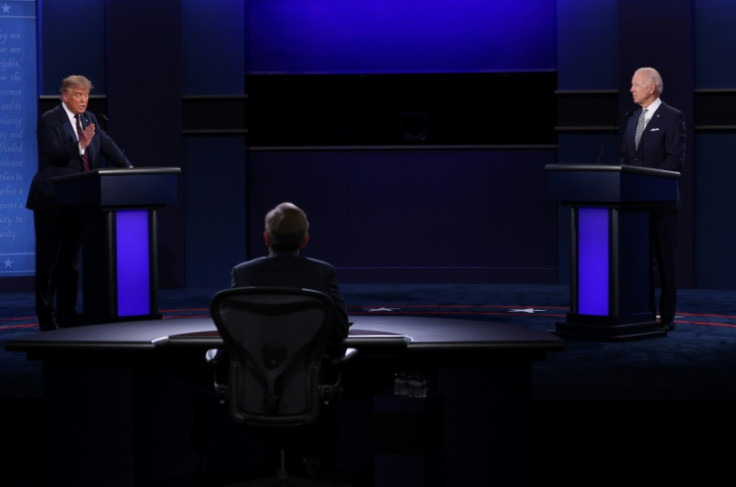Mic Cuts, No Audience: How The Biden-Trump Debate Will Work

There will be no studio audience, depriving candidates of the momentum that comes from ginning up supporters. Microphones will cut out when a candidate's speaking time is over. Thursday night's presidential debate will not be business as usual.
CNN, which is hosting President Joe Biden and his predecessor Donald Trump for their first debate of the 2024 campaign in Atlanta, wants to avoid the chaos seen when the two men squared off in 2020.
Here are some facts about the 90-minute debate, a key moment in the race for the White House, but one whose impact is difficult to predict.
In their first war of words four years ago, Trump repeatedly cut off the veteran Democrat, launched into lengthy diatribes and taunted his rival, who ended up shouting at one point: "Will you shut up, man?"
It was hardly the height of presidential decorum.
To cut down on the hijinks, CNN has set up a series of rules, to which both campaigns agreed.
Among the most notable: When the candidates take the stage at the network's Atlanta studios at 9:00 pm (0100 GMT Friday), there will be no one in the audience.
Microphones will be muted except for the candidate asked to speak. There will be two commercial breaks during the showdown between 78-year-old Trump and 81-year-old Biden, the two oldest presumptive White House nominees in history.
Moderators Jake Tapper and Dana Bash, both regular CNN on-air presenters, will "use all tools at their disposal to enforce timing and ensure a civilized discussion," the network said.
Biden won the coin toss, allowing him to choose either his podium position or whether he preferred to speak first or second in final statements.
The incumbent chose the podium on the viewers' right, and Trump opted to have the last word.
CNN has not revealed the debate themes, and does not plan to fact-check candidate statements in real time -- even if Trump repeats the baseless charge that the 2020 election was stolen from him.
For Kathleen Hall Jamieson, a professor of communication at the University of Pennsylvania, "one problem with a debate that features Donald Trump is that the moderators don't fact check in real time, nor should they."
"It's highly risky to try to do that and it would be disruptive of the debate if they did," she told AFP. "The danger is instead of informing, a debate could actually increase the amount of inaccurate knowledge."
Biden and Trump will not have teleprompters and they cannot bring pre-written notes to the stage, although they will be provided with paper and pen. Consulting with campaign staff during commercial breaks will not be allowed.
Both candidates rejected the oversight of the nonpartisan Commission on Presidential Debates formed in 1987 to manage such events.
Instead, they made a direct deal with CNN. The news network, now owned by media conglomerate Warner Bros Discovery, afforded its rivals the opportunity to broadcast the debate live in the name of public service, under certain conditions.
The screen must bear the CNN logo and outside commentary is forbidden.
Fox News -- which regularly attacks CNN as biased against Trump -- plans to hit the airwaves two hours before the event, with talk show hosts Jesse Watters and Sean Hannity providing pre-game insights.
In the past, Hannity has called Tapper a "radical left-wing partisan talk show host masquerading as a journalist."
The debate will certainly be a key moment in the campaign, watched by tens of millions: a record 84 million tuned in to watch Trump's first battle with Hillary Clinton in 2016, and 73 million saw Trump and Biden duke it out in 2020.
But it will not necessarily be a game-changer.
This is the first time a debate has been organized so early in the race, more than four months before Election Day, and even before the candidates have been formally nominated by their respective parties.
"The worry is that the public in the United States doesn't pay much attention to news in summer," said Jamieson.
"In general, presidential debates don't affect a sufficient number of votes to decide the outcome of an election. But when an election is close, as this one may be, debates can play an important role."
ABC is scheduled to host a second debate on September 10.

© Copyright AFP 2024. All rights reserved.





















